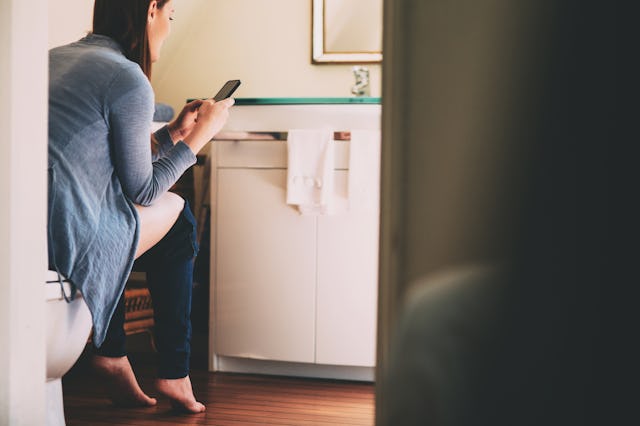If You’re Wondering How Often You Should Pee In A Day, The Answer’s Probably “Not Enough”
It’s easy to ignore the urge because, hey, you’re busy. But here’s what a doctor has to say about how many bathroom breaks you should be taking — and how to tell when something’s wrong.

Despite our best efforts, mom life often involves neglecting or delaying basic needs such as drinking enough fluids, which in turn means that precious toilet time is fleeting or can feel, at times, totally nonexistent. No shame or judgment — when you’re spending your days working, chasing kids around, trying to ensure your house is in order, and worrying about the other 99 items on your to-do list, sometimes the last thing you’re thinking about is a bathroom break. Amid the chaos, you might be wondering... exactly how often should you pee in a day? And that fleeting thought may grow even more persistent if you’ve noticed any recent changes to your health lately.
Turns out, your bladder’s health can actually tell you a lot about your overall health, so Scary Mommy tapped a doctor to break down the basics of peeing, including how often you should be going and what it means if something changes.
How often should you hit the bathroom?
While there’s no one concrete answer for how often you should be peeing each day, Dr. Felice Gersh, an OB-GYN and founder of the Integrative Medical Group in Irvine, California, notes that the average healthy adult should pee around six to eight times in a 24-hour period, but if you drink a lot of fluids, you might go more often than that.
What’s normal for you will likely differ from someone else, but the key thing to pay attention to is a sudden change in your own habits, says Gersh. “Normal urination should be painless, controlled, easy to perform, and not excessive,” she notes, adding that if something suddenly changes, that’s when you’ll want to check in with your doctor.
Other factors that impact how often you’ll need to go are your age (older folks will typically need to go more frequently), certain medications, types of beverages you’re consuming (alcohol and caffeinated drinks are known diuretics, which means you’ll need to go more often the more you down), and certain health conditions, such as pregnancy or urinary tract infections (UTIs) — more on those in a sec.
How do you know when something’s not right?
Thankfully, there are plenty of ways to know when something’s up with your urine, says Gersh. Among the telltale symptoms are:
- Frequency (you’re suddenly going far more often without an increase in fluid intake)
- A painful or burning sensation
- Urgency (you feel the urge to go more often)
- Incontinence (you’re suddenly unable to hold your pee)
- Blood in the urine (if it’s pink or red)
- Brown color
- An abnormal stream (i.e., your flow is suddenly slow or weak)
On the flip side, if you’re only going once or twice a day, you might simply be dehydrated, says Gersh, in which case you’ll want to increase your fluid intake and/or consume more water-rich fruits and veggies. Peeing too infrequently can set you up for UTIs, which can impact your urethra and bladder, and travel to the kidneys — a scenario you’ll want to avoid whenever possible.
Healthy urine will typically range from a shade of pale lemonade to clear, which means you’re adequately hydrated. If your urine is dark yellow or brown, you might be dehydrated. If you notice a pink or reddish tint, that’s a sure sign you might have an infection, says Gersh, and you’ll want to visit your doctor ASAP.
Rarely, sudden changes in urination can signal a serious neurological problem due to nerve damage from conditions like stroke, multiple sclerosis, spinal cord injury, or spina bifida; large uterine fibroids or other pelvic tumors; and/or ureteral (kidney) stones, says Gersh. So, checking in with your doctor if you have concerns never hurts.
Another concern is cystocele, which happens when the ligaments and muscles that support the bladder stretch or weaken, leading to a prolapsed, herniated, dropped, or fallen bladder. This can happen due to giving birth, family history, intense physical activity/straining, age, or a drop in estrogen levels that typically occurs near menopause, so a visit to your doctor might be in order if you exhibit signs of cystocele, such as sudden urgency/frequency to pee, frequent UTIs, pain in the pelvis and/or lower back, and more.
Frequent urination is a common and normal occurrence during pregnancy, as the hormonal changes and growing fetus create that “gotta go” feeling with more urgency. As with any changes, though, checking in with your OB-GYN is always a solid move with any bladder-related concerns during pregnancy and/or postpartum.
Is it ever OK to ignore the urge?
We get it. Sometimes taking 30 seconds to pee just isn’t in the cards, but Gersh urges you not to ignore the urge. When you hold off on hitting the toilet, “the risk of incontinence increases, and when the urge becomes overwhelming, the risk of getting an infection increases, and poor bladder hygiene can become habitual.”
Try to hit the bathroom every few hours and be sure to drink some fluids anytime you feel thirsty or your throat feels dry. You take care of everything and everyone else all day long, and your bladder just wants that same love and attention, too.
This article was originally published on